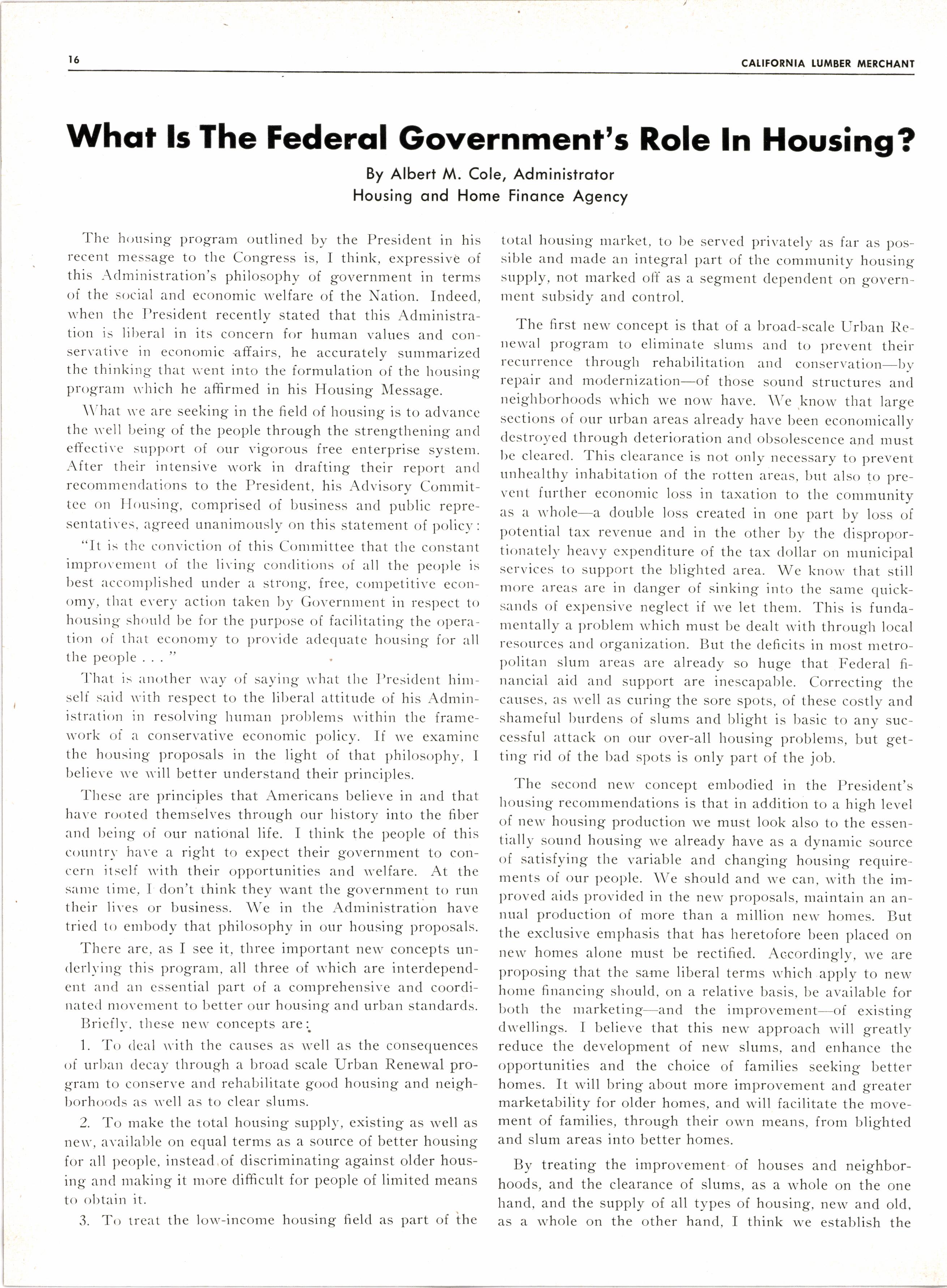
3 minute read
Whcrf ls The Federol Government's Role In Housing?
By Albert M. Cole, Administrolor Housing ond Home Finonce Agency
The housing prograrx outlined by the President in his recent message to thc Cor-rgress is, I think, expressiv€ of this -\dmir-ristration's philosophy of gor,ernment in terms oi the social ancl economic n'elfarc of the Nation. Indeed, u.hen the President recently stated that this Administratior.r is lilreral in its concern for human values and conservative irr economic affairs, he accurately summarized the thinking that ri-ent into the formulation of thc housing progrilllr u'hich he affirmed in his Housing Nfessage.
\\'hat u'e are seeking in the field of l.ronsing is to advancc the l'ell being of the people through the strengthening ar.r<l effcctivc supl)()rt of onr ligorous free enterprise system. Af ter their intensive u'ork in drafting their report ancl recommendlrtions to the President, his Aclvisory Committcc olt Ilousing, comprisecl of business ancl public representatives, agreed unanimousl-v on this statement of policr.:
"It is thc convictior.r of this Clrnrmittee that thc constant improvcment ()f the lir-ing cor.r<litiorrs oi all the people is best acconrplishecl uncler ir strong, frec, cornpetitir.c economy, thut everv action taken lt1' Governntent in respect to housing shorrlcl be for tl're llurpose oI facilitating the olteratior.r ol that ecor-romy to provide adccluatc housilrg for lLll
thepeople..."
'l'hat is lurother l'ay of saying u'hat tlre ]'residclt hituself said u'ith respect to the liberal attitucle oi his Adn-rinistration in resolving human problems rvithin the framervork of a conservative economic policy. Ii n'e examinc thc housing proposals ir-r the light of that philosophr'. I belier-e u'c l'ill better understand their principles.
'I-hcse are lrrinciples that Americans believe in :u.rd tlrat har,e rooted themselves through our history into the fiber ar.rd being of our national life. I think the people of this countrv huve a right to expect their government to cont:errr ilself with their opportunities and.n'elfare. At the s;tnre tinte, l clon't think they rvant the government to rull tl.reir liles or business. \\te in the Administration have tried to enrbody that philosophy in our housing proposals.
Thcrc are. as I see it, three important nerv concepts unrlerl-r'ing this program, all three of l'hich are interdependent ancl arr cssential part of a compreherrsive and coordinateil nrolcment to better our housing and urban standards.
Bricflv, these neu' concepts are: l. 'fo <lcal u'ith the causes as \\'ell as the consequences of urlxrl decay through a broad scale Urban Renewal program to conserve and rehabilitate gocid housing and neighborhoo<1s as u'ell as to clear slums.
2. To nrake the total housing suppll', cxisting as u'ell as ne\\', alailable on equal terms as a source of better housing f<-rr all people, instead of discriminating against older housing ancl nrill<ing it l11ore difficult for people of limited means to obtain it.
3. T() tre:rt the lovr'-income housing field as part of the total h<>using rnarket, to lte served privatell. as far as possible ancl made arr integral part rif the community housing supply, not marked olT as a segment dependent on governrncrrt subsidy and control.
The first 1te\\r concept is that of a ltroad-scale Urban Iterrerval prog'ram to eliminate slums :rnd to prcvent their rccurrence through rehabilitation :ur<1 conservation-1.>.y repair and modernization-of those sound structures an<l rreighborhoods n hich rve nolv have. \\re ,knolv that large scctions clf our urban areas already have lteen economically <lcstrovecl through deterioration anrl ol>solescence and must lrc cleared. This clearance is not orrly necessary to prevent unl.realthy inhabitation of the rotten Arers, brrt also to prevent further ecr>nonric loss in taxation to thc cor-nmunity as a n'hole-a double loss createcl in one part by loss of potential tax revenue and in the other bv the disproportiorratelv l-rear.y cxpenditure of the tax rlollar on nrunicipal services to srlpport the blighted area. We kr.rou' that still nr()re irreas arc in danger <-rf sinking irrto the sarne quicks:rrrcls of expensive neglect if n'e let them. This is fundanrer.rtally a llroblem rvhich must lle dealt rvith through local resorlrces and organization. But the cleficits iu nrost metropolitan slum areas :rre already so huge that Federal firranci:rl aid an<1 support are inescapable. Correcting the cirrlses, as u'ell as curing the sore sp<tts, of these costly and shamcful lturdens of slums and ltlight is l>asic to any successful attack on orlr over-all housing problems, but getting ritl of the bad spr,its is only part of the job.
The second new concept embodied in the lrresident's housirrg recommendations is that in addition to a high level cif nen housing production rve must look also to the essentially sourrcl housing we already have as a dynamic sorlrce of satisfying the variable and changing housing reqrrirements of our people. We should and u'e can, .rvith the improvecl ai<ls providecl in the nelv proposals, maintairl an annual production of more than a million neu' hornes. But the exclusive emph:rsis that has heretofore been placed on nerv homes alone must be rectified. Accorclingly, rve are proposing that the same liberal terms u,hich apply to neu' horue financir.rg should, on a relative basis, be available for both the marketing-and the improvement-of existing du'ellings. I believe that this ne\,v approach u'ill greatll' reduce the development of neu' slums, and enhance thc opportunities and the choice of families seeking better homes. It will ltring about more improvement and greater marketability for older homes, and u'ill facilitate the movement of families, through their on n means, from blighted and slum areas into better homes.
By treating the improvement of houses and neighborhoods, and the clearance of slums, as a whole on the one hand, and the supplv of all types of housing, neu'and old, as a n'hole on the other hand, I think we establish the

![s[1] F0Rlt - [usslER, I ltc.](https://assets.isu.pub/document-structure/230727185842-677f6473f690083dd03489acf2720150/v1/7ec4dfce9b24870cc46a618753426759.jpeg)








